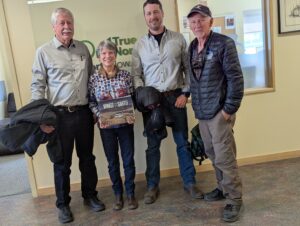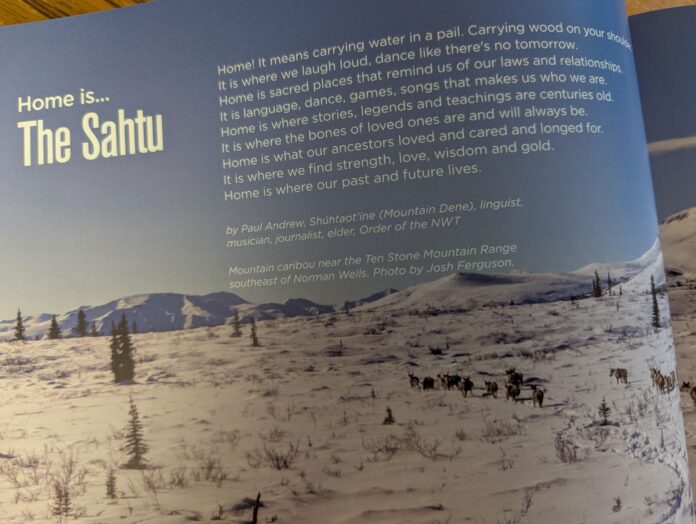Wings Over the Sahtu tells the story of a family-run and Indigenous community-led air fleet founded by a trailblazing veteran pilot.
A pilot for 50-plus years, Warren Wright is among N.W.T.’s trailblazing aviators and is still flying today. He credits his family and the Sahtu communities with making it all possible. This book tells the story of how, together, they grew the airline into an 80-member team of crew flying a fleet of 11 aircrafts.
It may sound like a story out of a Jordan Wheeler script, but it’s actually the true life story of Wright, his family and the Sahtu Indigenous communities he credits for being the “heart” of the grassroots airline company he first founded with his wife, Carolyn.
Wright told True North FM that people he has encountered who travel to the Sahtu region ask – ‘Where did you come from? How did you end up in the North?’
“That was the whole idea of the book,” he explains. “Finally, I said, okay. Put it down in a story form. That’s when we got a hold of Bill Braden.”
In 2023, Warren and his wife Carolyn Wright approached Braden to pen the story.
As son Travis Wright pointed out, they didn’t want the book to be a “novel,” they wanted to paint a picture of the company’s history that was more snapshot than novel.
In the book, Wright offers a glimpse of what it was like to come to the North back in 1974. As a newly minted pilot and aircraft mechanic.
Wright had run into tough economic times but found a window of opportunity in the North. The son of a third-generation Scottish farming family from Dundalk, Ontario, he made the trip to Normal Wells when he was just 25 years old after being offered a job as a pilot engineer at Nahanni Air.
“It was not unusual to be flying into the early morning hours during the summer. It was always GO! Then I’d return from the mountains and another load of big game hunters was standing on the dock asking, ‘Are you our Kamikaze pilot taking us up into the mountains? I couldn’t talk. All I wanted was a coffee with sugar in my veins to get me through to the end of the day,” says Wright in the book.
Fast forward 50 years ahead, Wright joins his family and Elders from the Sahtu communities to tell the story of aviation, friendship, family and community put to paper by Braden.
After Wright and his wife Carolyn rebuit a small airline company that had originally been owned by Perry and Phyllis Linton, they decided to transfer over half of the ownership to the Indigenous communities of the Sahtu.
“We wanted them to be part of the whole operation because they are our clients so why shouldn’t they have a part of it,” Wright explained.
Wright said that when he first arrived in the Sahtu, he got to know and became close friends many of the people who are now Elders in the Sahtu communities.
“I just fell in love with the area and the people, especially the people of the Sahtu and one thing evolved into the other,” said Wright.
“I lived here so long that I just wanted them to be part of the company and that’s where it kind of evolved from,” said Wright.
Part of the reason for the book was to show the great respect he has for the people of the Sahtu. Wright explained that he witnessed the North “come together” through the people of the Sahtu.
The Wright family along with Indigenous Elders including Délı̨nę First Nation Chief Danny Gaudet, former Délı̨nę First Nation Chief Leonard Kenny, Edwin Erutsi, Chief Richard Kochon, former N.W.T. MP Ethel Blondin, Leon Andrew and Paul Andrew guided Braden in chronicling the North-Wright Air story.
As written in the book, Chief Danny Gaudet describes the partnership’s success being owed to Wright’s reputation among Sahtu Elders as a skilled and safe pilot who was respectful of his passengers and built a relationship of trust with them. “They trusted their lives with those pilots,” explains Chief Gaudent. “Trust comes with people who don’t go away.”
The book features pivotal milestones in the family-based company who personally oversaw the transfer of the majority of their ownership to the Délı̨nę and Fort Good Hope Indigenous development corporations in 2000. Soon afterwards, the Norman Wells Dene / Métis business agency joined and a similar partnership with the Gwich’in Tribal Council followed.
The Wright family continues daily operations with son Travis and daughter Janalee as president and vice president.
Wright and his son explained that no decisions are made without the approval of the company’s Indigenous leadership.
The Norman Wells-based airline serves the Sahtu region’s five communities: Norman Wells, Délı̨nę, Fort Good Hope, Tulita and Colville Lake, along with Aklavik, Inuvik and Yellowknife.
Travis explained that the company provides a necessity to the communities, who rely on air travel especially as the ice roads have become less reliable and with river barge service at risk of being cancelled. He explained that the company works as a “lifeline to the community and hopes to be for many years to come.”
The book looks at over 100 years of aviation in the North and it’s that partnership with the people of the Sahtu that Wright and his family agree is most important.
“I think the importance of the book is the partnership with the local community groups around Norman Wells, I think that’s a huge success story there that my father had taken part in, he had a vision for this and it became what it is today,” Travis.
“Hopefully down the road, it could be 100 percent Indigenous owned. The indigenous people have been here for thousands of years. They’re gonna be here for a thousand years more. We just hope that this company can be that a thousand years down the road with them,” said Travis.
Wright and his son pointed out that the field of aviation is still young, and there is still much to be learned, as not all of it has been good, but aviation is and has always made possible a space for growth and change.
Wright offered this insight from his own lived experience to young pilots:
“I think the chance come North, work for an air service like ourselves, Air Tindy, Buffalo, any one, put your time in, get the experience, don’t just hit and run,” advised Wright.
Write recalled the way many of the pilots he knows left the North and went to work for big airlines, but still look back at their time bush flying as the ‘time of their life.’
“Slow down, the world will still be there and the airline job will still be there, but come and spend your time in the North and you’ll never regret it.”






